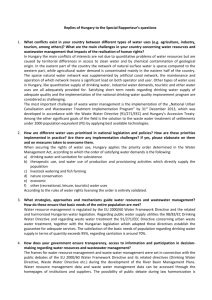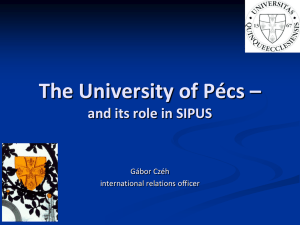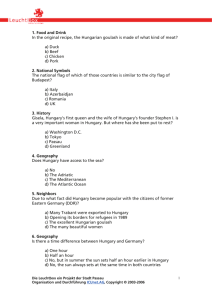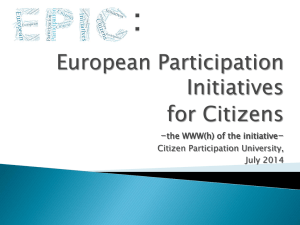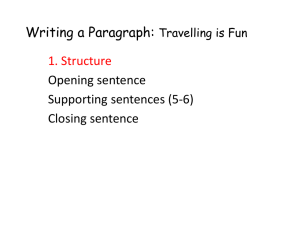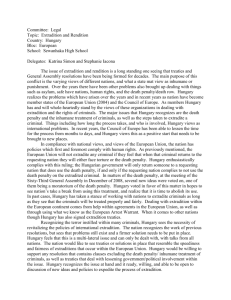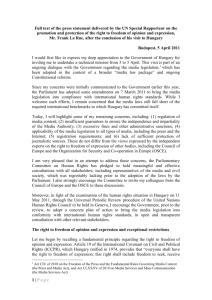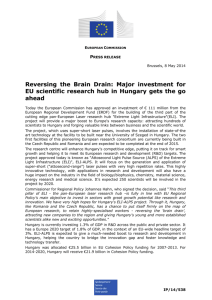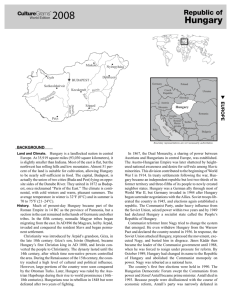Course Aims
advertisement
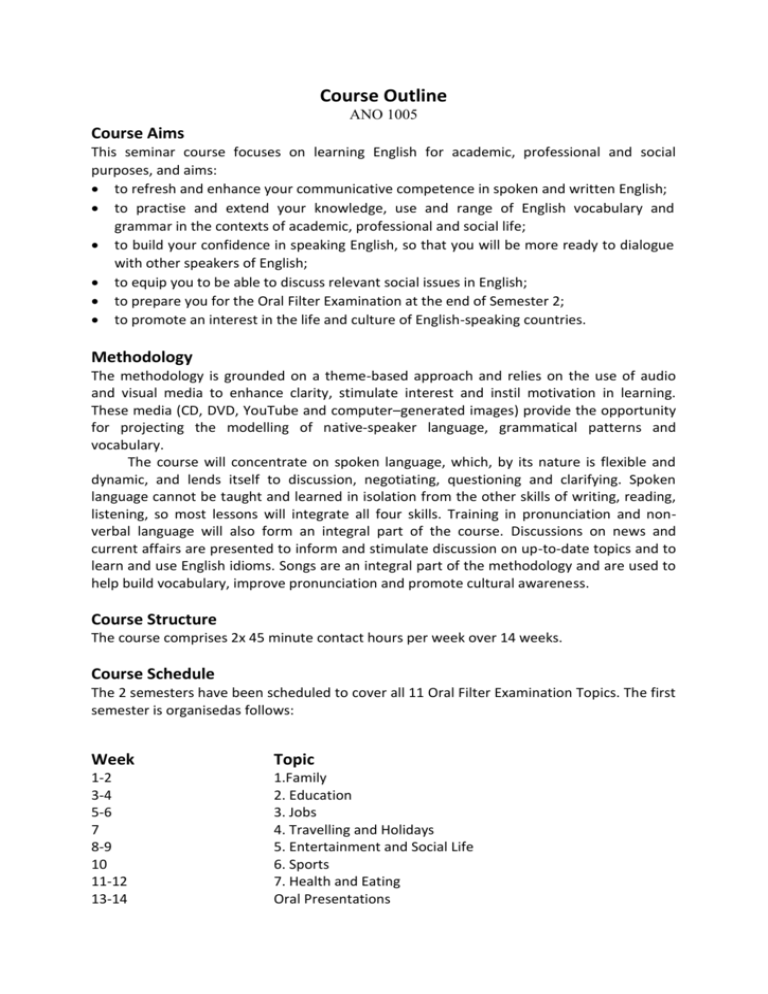
Course Outline ANO 1005 Course Aims This seminar course focuses on learning English for academic, professional and social purposes, and aims: to refresh and enhance your communicative competence in spoken and written English; to practise and extend your knowledge, use and range of English vocabulary and grammar in the contexts of academic, professional and social life; to build your confidence in speaking English, so that you will be more ready to dialogue with other speakers of English; to equip you to be able to discuss relevant social issues in English; to prepare you for the Oral Filter Examination at the end of Semester 2; to promote an interest in the life and culture of English-speaking countries. Methodology The methodology is grounded on a theme-based approach and relies on the use of audio and visual media to enhance clarity, stimulate interest and instil motivation in learning. These media (CD, DVD, YouTube and computer–generated images) provide the opportunity for projecting the modelling of native-speaker language, grammatical patterns and vocabulary. The course will concentrate on spoken language, which, by its nature is flexible and dynamic, and lends itself to discussion, negotiating, questioning and clarifying. Spoken language cannot be taught and learned in isolation from the other skills of writing, reading, listening, so most lessons will integrate all four skills. Training in pronunciation and nonverbal language will also form an integral part of the course. Discussions on news and current affairs are presented to inform and stimulate discussion on up-to-date topics and to learn and use English idioms. Songs are an integral part of the methodology and are used to help build vocabulary, improve pronunciation and promote cultural awareness. Course Structure The course comprises 2x 45 minute contact hours per week over 14 weeks. Course Schedule The 2 semesters have been scheduled to cover all 11 Oral Filter Examination Topics. The first semester is organisedas follows: Week Topic 1-2 3-4 5-6 7 8-9 10 11-12 13-14 1.Family 2. Education 3. Jobs 4. Travelling and Holidays 5. Entertainment and Social Life 6. Sports 7. Health and Eating Oral Presentations Attendance Please note that in line with college policy on attendance, missing more than three seminars will result in a failure of the subject, unless there are extenuating circumstances which have caused absence for more than three seminars. Semester 1 Topic 1: Family 1.1 1.2 1.3 1.4 Family Roles Divorce Youth Problems Homelessness Topic2: Education 2.1 2.2 2.3 2.4 School Types Language Learning Education in English-speaking Countries Rights of Students Topic3: Jobs 3.1 3.2 3.3 3.4 Working in the European Union Job Satisfaction Priorities in Life Unemployment Topic4: Travelling and Holidays 4.1 4.2 4.3 4.4 Travelling by Car, Train, Ship, Plane Accommodation Crossing Borders, Travelling Abroad Organising a Holiday Topic5: Entertainment and Social Life 5.1 5.2 5.3 5.4 Types of Entertainment Computers Media Mobile Phones Topic6: Sports 6.1 6.2 6.3 6.4 Traditional Sports Olympics Extreme Sports Doping Topic7: Health and Eating 7.1 Diseases 7.2 7.3 7.4 Addictions Smoking, Drugs, Alcohol Healthy Diet, Keeping Fit Assessment Your assessment will incorporate classroom participation (20%), and an oral presentation (80%). For the classroom participation component, you will be required to be actively involved in the class and contribute to discussion and debate. For the oral presentation you will be required to prepare and deliver a presentation supporting your point of view on your chosen topic, taken from the topics covered in the course (see above), or the relevant social issues (see below). Your oral presentation needs to include a PowerPoint presentation, which should be submitted one week before you are due to give your presentation. Associated social issues will be covered generally in the course and vocabulary and ideas pertaining to them will be discussed in class. However, you will need to research the topic outside class time to prepare your argument. You will be required to speak on your topic for at least ten minutes, without the aid of the full script. Only short notes in point form will be permitted during your presentation. You are encouraged to be as creative as possible in your presentation, so make use of the technology which will be made available (i.e. laptop, internet access, CD/CVD player). 1. Family 1.1 More women should be in leadership positions in the workforce? 1.2 Marriage is no longer regarded as important. 1.3 The high unemployment rate in Hungary is causing hopelessness among young people. 1.4 There are more and more homeless people dying on the streets, especially at winter time. 2. Education 2.1 The subjects being taught in schools are not relevant to the requirements of employers? 2.2 The decrease in the number of births among Hungarian families is causing a decrease in the demand for teachers, which means a reduction in teacher training courses. 2.3 The education system in Hungary needs to be aligned with other EU countries. 2.4 Even though students have basic rights, the power of the teacher is still very prevalent in the Hungarian education system, and teachers exploit this to their advantage. 3. Jobs 3.1 There is a growing concern in EU countries regarding the exploitation of workers and getting them to work illegally. 3.2 Workers in Hungary are working for much less that they should, so that they can keep their jobs. 3.3 In Hungary there is a marked increase in the incidence of alcoholism and depression, especially among men, because of unrealised life goals and expectations. 3.4 The high unemployment rate and lack of prospects is breeding a sense of hopelessness for the future among the young people in Hungary today. 4. Travelling and Holidays 4.1 The amount of ground and air traffic is causing major environment problems. 4.2 Hospitality employees are paid very little and have to work very long hours. 4.3 The main Budapest airport has reduced staff to save money, so there are not enough customs officials to control and detect the entry of illegal passengers. 5. Entertainment and Social Life 5.1 TV has become the most influential media in our society and has become the most problematic in regard to the promotion of addiction to pornography. 5.2 Computers have become a necessary part of life, but they have become an addiction for many who have forgotten what it is like to live in the real world and to have real personal contact. 5.3 There is a growing opinion that there needs to be more censorship of the mass media. 5.4 Mobiles in public places, such as in the theatre, the classroom, the restaurant, are a menace, because they disturb others with their ring tones, and people speak loudly on their phones so that everyone can hear their conversations. 6. Sports 6.1 Sport is not an integral part of the school curriculum in Hungary. This situation needs to change if Hungary is to become a healthy nationand if it is produce world class sports people. 6.2 Hungary’s medal tally of 17 (9th position) in the 2012 games was a big improvement on that of the 2008 games (10). This perhaps is an indication that the priority given to sport in schools is on the increase. 6.3 Too many young people are being injured or killed while doing extreme sports, so there needs to be some sort of tighter regulation of their limits of safety. 6.4 There is a growing concern among the sporting world in Hungary about the number of young athletes who are taking drugs to enhance their performance. 7. Health and Eating 7.1 It has been proven that people who use solariums have double the risk of getting skin cancer before the age of 40. As such, solariums should be banned. 7.2/3 The depressed economic and social environments in Hungary have caused a lack of hope for many Hungarians who resort to addictions to escape reality. 7.4 As a result of the unhealthy lifestyle and eating and cooking habits of the Hungarians, the Hungarian health system is struggling to cope with the related costs due to these problems. Grading Criteria I am advising you in advance of the exam the criteria on which you will be graded. This is aimed at helping you in your preparation, to ensure you are aware of the expectations of the exam and to avoid any misconceptions on how you will be assessed. Criteria Descriptors Fluency and Coherence: Ability to speak smoothly and expressively with logical sequencing of sentences 10 Grading Accuracy: Ability to produce correct sentences using correct grammar and vocabulary 10 Pronunciation: 10 Ability to pronounce words correctly with appropriate stress and intonation Communication: Ability to display appropriate body language and facial expressions Presentation: Ability to support effectively concepts and ideas through visual media (*grade scores: 0-16 = 1; 17-21 = 2; 22-27 = 3; 28-33 = 4; 34-40 = 5) The Use of Visual Media You are encouraged to use visual media (PowerPoint or Posters) in your oral presentation. Here are some useful guidelines in preparing visuals: Make it clear Visuals should be concise, simple and relevant. Arrange your visuals in a logical sequence in line with your presentation structure. 5 5 Total 40* Use one message per slide. Limit the amount of text on each slide. Check spelling and grammar. Make it big Visuals should be readable from the back of the room. Use a large font (at least 24 points). Choose a simple font, like Helvetica, Arial or Times. Don’t use all capitals. Make sure captions on pictures or graphs can be clearly seen from the back of the room. Make it simple Your slides should be simple and clear. Avoid busy backgrounds that make text hard to read. Use animations sparingly. Use clear sound and sharp focus if using video clips. Avoid the sound effects that accompany PowerPoint animations. Be visual Ensure there is a clear contrast between text and background colour. Use a highlight colour to emphasis key words. Don’t use too many colours on one slide. Use colours that harmonise rather than clash. Choose graphic material to support your presentation. Pictures should be clear and in focus. Remember: Visuals are aids to support and enhance an oral presentation – they are not the focus – you are. Course Outline ANO 1013 Course Objective The objective of this course is to provide you with an understanding of the culture and history of the United Kingdom (Great Britain and Northern Ireland). The course will cover various aspects of this English-speaking country. Topics covered will include geography, history, politics, religion, education, cultural diversity, economy, sport and leisure, the monarchy, media and language. The course aims to give you an appreciation of British society, of the role this country played in establishing a strong colonial presence in a number of regions of the world, and how it has contributed to the modern western and global civilisation. The course is intended to prepare students for further study in English-speaking colonial civilisation. Course Structure The course comprises one 45-minute lecture and one 45-minute seminar per week over 14 weeks. The outline of topics covered is shown below: Week Lecture Topics Seminar Topics 1-2 3. 4. 5. The United Kingdom – Overview Scotland – Overview Wales – Overview Northern Ireland – Overview EU Referendum De-United Kingdom Volunteering and Wellbeing Has Anything Really Changed? 6-7 Monarchy 8. Muslims 9. Hungary 10. 11. 12. Literature 13. 14. The British Monarchy and Legal System British Holidays and Celebrations British Education and Economy Why UK Should Abolish its UK Teachers Scared of Offending Britain Lags behind Lithuania and British Sport and Recreation British Media and Politics British Literature and Religion Racism is Rife in English Football The Islamic Future for Britain Why Students Should Study British Accents and Dialects Review English Too Easy for Hungarians Oral Presentations Assessment Your assessment comprises an oral presentation for the seminar and an oral exam for the lecture. For your oral presentation, you will choose a topic related to any of the above list of Seminar Topics. Your presentation should be 10-15 minutes, and you will be required to use a variety of media to enhance your presentation, in particular, PowerPoint, with the acknowledgement of your resources on a separate slide and the end of your presentation. Notes can be used as a guide, but must not be read verbatim. Presentations shorter than 10 minutes will incur a reduction in grade. The use of a laptop computer, data projector, and video/CD facilities will be made available for your presentation. For the lecture, you will be required to take an oral exam, based on the main Lecture Topics listed above. Assessment Criteria and Grading for Oral Presentations Criteria Oral skills Delivery Content Relevance Cohesion Creativity Media Clarity Weighting 20 10 20 10 10 10 10 10 Grading Mark 90 – 100 75 – 89 65 – 74 50 – 64 Below 50 Grade 5 4 3 2 1 Attendance Please note that in line with college policy on attendance, missing more than three seminars will result in a failure of the subject, unless there are extenuating circumstances. Reading Resources There are no set texts, but notes and excerpts from books and articles will be provided. References to other resources and internet sites will also be provided. The course notes are accessible on the web site: http://zeus.nyf.hu~granville.pillar

![View full document [DOC 121.00 KB]](http://s3.studylib.net/store/data/007311467_1-d846f7b116a73f74023d7a29ba436503-300x300.png)
